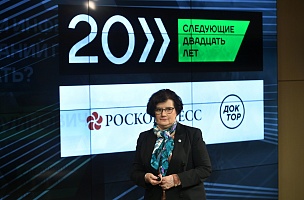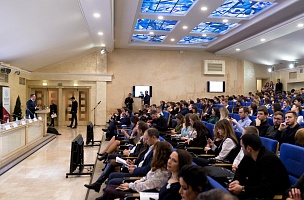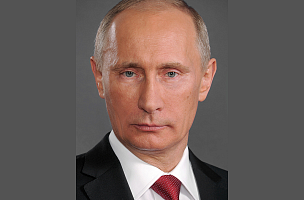KEY CONCLUSIONS
Good habits improve the quality of life of people and brings economic benefits to the state
“It is very important that people eat right. We have almost completed the Occupational Safety Doctrine. We produce everything. After 2014, our stores have full shelves, and basically all goods are produced domestically,” Anna Popova, Head of the Federal Service for Surveillance on Consumer Rights Protection and Human Wellbeing – Chief State Sanitary Physician of the Russian Federation.
“It is imperative to review the redistribution of funds from the federal budget to the local ones. We need to invest more in sports and other forms of self-realization, from children to the elderly. And, of course, in promoting a healthy lifestyle. Firstly, we will save later on the treatment of these same people. Secondly, it is a pragmatic approach, since an ill person, a drinking person does not create added value, does not create a unique trading product, and as a result, we do not receive budget revenues,” Alexander Brechalov, Head of the Udmurt Republic.
PROBLEMS
Rising number of obese children
“Children who grow up in families with a wrong food culture, are certainly much more likely to be obese. This is something that we have to deal with. The task is not for it to decline, the task is for it not to grow. That is how big the problem is today. Because it further leads to endocrine pathologies, pathologies of the digestive tract,” Anna Popova, Head of the Federal Service for Surveillance on Consumer Rights Protection and Human Wellbeing – Chief State Sanitary Physician of the Russian Federation.
“We have developed and are implementing the federal project “Strengthening Public Health”, and I must say that the main task of this project in the context of nutrition is ... to reduce the increase in the number of people suffering from obesity. We are not talking now about cutting it down, we are talking about stopping its growth. At the moment, this increase is a little over 3%, if I'm not mistaken, which, I must say, is less than the increase that was generally expected. This suggests that the measures that are being implemented today are having a serious effect,” Oleg Salagay, Deputy Minister of Health of the Russian Federation.
“Of course, the problems are associated with digitalization. Among the child population, it causes such problems as overweight and obesity. Up to 10% of children are faced with such a problem. And of course, another reason here is also excessive consumption of sugar and salt,” Alexander Tarasenko, Deputy Minister of Health of the Republic of Belarus.
The negative impact of advertising
“I would like to draw attention to the problem of new challenges that lie not only in the diet, but also in the new media, for example, which in general are very active in promoting unhealthy consumption. For example, today there is conclusive scientific evidence that shows that the promotion in social networks (even involuntary promotion), of some food products is extensively reflected in children,” Oleg Salagay, Deputy Minister of Health of the Russian Federation.
“Advertising promotes, probably, not quite a healthy lifestyle. We conducted an experiment. I know that such work was carried out both in the Russian Federation and in the Republic of Kazakhstan, and in 50% of cases, products that are advertised, are mostly consumed by children, and they are not healthy,” Alexander Tarasenko, Deputy Minister of Health of the Republic of Belarus.
SOLUTIONS
Forming healthy habits in the population from an early age
“In children, first of all, it is necessary to form taste preferences for proper nutrition. <...> We are a lost generation in terms of healthy lifestyle, we must catch up. <…> But our children today must receive such knowledge and sanitary education that will protect them in the future from the problems that we have. <…> The Russian Federation cares a lot about children, this is a social achievement of the country, which may be underestimated in society,” Anna Popova, Head of the Federal Service for Surveillance on Consumer Rights Protection and Human Wellbeing – Chief State Sanitary Physician of the Russian Federation.
“We need to work with the population, with adults, as much as possible. Well, with children, this work is much easier,” Alexander Tarasenko, Deputy Minister of Health of the Republic of Belarus.
“We tried to refocus our budget on healthy lifestyles. [As one of the ways, we used. – Ed.] an extensive and aggressive promotion of a healthy lifestyle in terms of nutrition. Here we took the best recommendations and methods of the Ministry of Health, Rospotrebnadzor, our institutions, and regions, and we simply landed them and adapted them in the republic. And we have achieved good results in this direction,” Alexander Brechalov, Head of the Udmurt Republic.
Working with manufacturers to improve product quality
“Of course, we also work with manufacturers. And today this is the first task that we see before us – to work manufacturers to reduce [the share of content in products – Ed.] sugar, salt, trans-fatty acids... There are new challenges ahead,” Alexander Tarasenko, Deputy Minister of Health of the Republic of Belarus.
“The safety of our Russian products is wonderful. In general, I think, it is our country’s competitive advantage, which is probably underestimated somewhere. <...> We are currently developing a product range for children. And in general, we completely revised the range two years ago. <...> We have released products without preservatives and without additives. It is genuinely something that you can make yourself or buy in a shop and cook for your children. Since the trend towards convenience is obvious today, we are trying to make healthy semi-finished products as well,” Anastasia Mikhailova, Director of the Сommunications Directorate, Cherkizovo Group.
For more information, visit the Roscongress Foundation’s Information and Analytical System at roscongress.org/en






